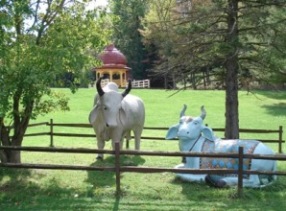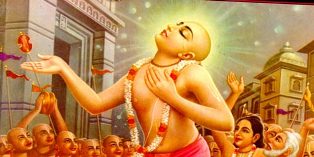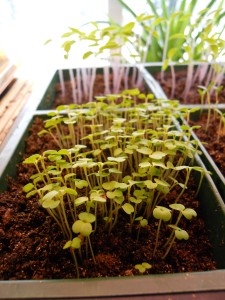Family Constellation 4 Day Special Seminar: March 21 to March 24
Facilitated by Krsna Lila Devi aka Cristina Casanova, experienced certified trauma specialist, and school administrator at the Dept of Education, Counseling Psychology Dept. in N.Y City for 33 years.
**
This exciting Family Constellation Seminar will be held in New Vrindaban on:
Thurs Mar 21 & Fri Mar 22; 10:30 AM to 1:30 PM and 3 PM to 6 PM– for devotees
Sat Mar 23 & Sun Mar 24; 10:30 AM to 1:30 PM and 3 PM to 6 PM – open to the public
The Emergence of the Bees
The Emergence of the Bees
by Jayadevi dasi
On Sunday, March 10, the first mild and sunny day near spring, I visited my friend and her two beehives. Many workers were buzzing around their narrowed winter entrance. They were defending the entrances against predator wasps attempting to get inside, and doing a great job. I sat in the sun, mesmerized by their diligence and determination to protect their hive, despite being a little slow from their winter dormancy.
After a winter as harsh as this one, we beekeepers approach our hives with hope and fear, “Did the colony survive?” The worker bees keep a constant temperature of about 95 degrees F, (35 degrees C) in a core area of the hive, even in the deepest cold of winter or in the tropical heat.
The life spans of worker honeybees are on average between four and six weeks during the active season, but those reared late in the season may survive until spring, as they do little during the cold months except feed and keep warm. The average life span of a queen honeybee is one to three years. A drone dies immediately after mating with the queen. Drones are prevalent in colonies during the spring and summer months. As autumn approaches, they are evicted from the hive, and soon die of starvation and exposure.
With the happy discovery that the hive I tend survived the winter, some other miraculous, groundbreaking research had determined that the nano-particles in bee venom containing the chemical Melittin destroys the HIV virus that causes AIDS and leaves the surrounding cells intact.
A baby born with the HIV virus was cured within two days using melittin therapy.
Bee sting therapy, aka apitherapy, has long been used in the treatment of arthritis. The medical writing of Hippocrates, Pliny the Elder and Galen refer to apitherapy. Bee venom is also thought to help ease the symptoms of multiple sclerosis, tendonitis, and fibromyalgia. The peptide melittin stimulates the production of cortisol, an anti-inflammatory.
Of course, bee sting therapy cannot be used for people who are allergic to bee stings. A beekeeper typically builds a tolerance to stings and while they avoid getting stung as much as possible, the stings are sometimes welcome as a type of elixir (at least in my experience.) My last stings occurred when I harvested a small amount of honey for Balarama’s appearance day.
All glories to the Dear Apis Mellifera!
Gaura Purnima Festival Tuesday March 26th
MORNING:
5:00 AM MANGAL ARATI
5:30 AM NRSIMHA PRAYERS
5:45 AM TULASI PRAYERS
6:00 AM JAPA
7:45 AM GURU PUJA
8:00 AM GREETING THE DEITIES
8:30 AM SRIMAD BHAGAVATAM CLASS
EVENING:
5:00 PM TO 6:00 PM ABHISHEKA ON THE ALTAR
6:00 PM TO 7:00 PM LECTURE
7:00 PM TO 7:30 PM ARATI
7:45 PM Cultural Presentation
8:15 PM PRASADAM FEAST
Following the moon
February 25, two weeks ago was a beautiful red Full Moon.
It was a good day to germinate plants. I was handed a heating pad and thermometer to start pepper and tomato seeds for Madhava Gosh and myself. At my in laws’ house they have a stand with grow lights built in. Perfect for starting seeds.
Peppers like a warm soil, from 80-90 F, and tomatoes a little less 70-80. The heating pad fits two trays, which take 10 seed starting containers. Once you start the pad, it’s best to fill up all the space in the trays with soil so you don’t lose heat. Therefore I decided to start as many as possible of the other seeds that I had. Some flowers, a few herbs and perennials for the my home garden, as well as the Deity Garden.
I planted some the last day of February, which is 10 weeks from the last frost date here in Moundsville, WV. Which means, I will have to transplant these seedlings to cell flats, then to small or medium pots where they can grow and harden off, before going into the ground in Mid May. Or they will get a bigger pot, if they are to be grown inside the greenhouse, like some of my tomatoes.
Some of these seeds, I know are very unlikely to succeed. They have specific needs that can be hard to care of. There are some seeds that have been sitting in a drawer for a few years. Others we just got them in the mail, but only 2 out 20 sprouted!
Like the old timers, I try to be in sync with earths natural cycles. Sun, Moon, Stars. For my daily spiritual routine, sadhana, I follow the sun. For my garden, I consciously make an effort to follow the moon. The astros complicate things even more, so I don’t give too much thought to it, yet.
Sunday the 10th we sprang our clocks forward an hour. A sign of spring to come. Monday the 11th is the New Moon, good time to germinate or sow vegetables and annuals that produce above ground. Around 1st quarter moon is when spring officially starts.
Next full moon is the most auspicious Gaura Purnima. Thanks and praises to the Lord for his mercy upon us!
Most of the sprouts have sprouted and will soon be ready to be transplanted into flats.
Prunella, Brugmansia, Datura, Sacabiosa, Coreopsis, Marigold, for the Deity garden, Peppers and Tomatoes, for myself and Ghosh, and Coriander, Arugula, Spinach for my garden have sprouted.
Auspicious immersion of Joanne Fried_Sechena’s (Mother of Gopisa & Harinama Cintamani) ashes to Ganges
Hare Krishna:
On this most auspicious day, the Appearance Day of His Divine Grace Srila Bhaktisiddhanta Sarasvati Thakura, a portion of Joanne Fried-Sechena, the fortunate mother of Sriman Gopisa dasa and Harinam Cintamani dasi, ashes are entering the Ganges in a ceremony along with Madhavananda dasa, the son of Citrarupini devi dasi (acbsp)of Italy who was initiated and beloved by Radhanath Swami, along with ashes of the mother of Mahalaxmi devi dasi from Spain.
In attendance and officiating will be H G Jananivas Prabhu, HH Radhanath Swami, HG Madhusevaita (gbc_Italy) and several other members of ISKCON GBC body, along with many other guru’s and sannyasi’s. Dear Devotees, please add your prayers for her spiritual success. The remainder of her ashes will enter the Jamuna in approximately two weeks.
yrs, malati dd from Sridham Mayapur
Memories of Ruci’s father, Al Ianuzzi, and Bhokta das
by Sachimata dd
It was always an interesting experience to be in the company of Al Ianuzzi, Ruci’s dad. He was a delight to say the least. Being of Italian heritage, and learning that I was also of Italian background gave us lots to talk about. As it happened, our forefathers came from the same part of southern Italy, Calabria. Of course, each and every time we met, he would hash over the same information, but never became bored with it. He was definitely a cheerful soul, and was very witty and sharp in mental clarity.
I had the very good fortune to be invited to Thanksgiving dinner at Ruci and Sankirtan’s house this last November. Little did I know that it would be the last time that I would have the company of Al. We sat next to each other and I offered my condolences on the recent loss of his beloved wife, Ruth. He thanked me, but acknowledged that it was for the best, given her end situation. Then he just went on joking around and having a nice time.
Sankirtan offered a little prayer of thanks, which turned out to be a bit lengthy, as we all know that Sankirtan is an expert story teller. But Al was very hungry and everyone had brought a dish, and Mother Ruci had been cooking for a couple of days, and he wanted to eat. So he kept interjecting little comments about OK that’s great, now let’s eat, the food is getting cold, or OK, we are all thankful, now let’s eat, the food is getting cold, and I’m hungry. Anyway, he ate heartily that day, and had a very good time. I think he especially enjoyed talking to everyone, and getting to know his granddaughter’s new boyfriend, Justin, who had come to N.V. to share Thanksgiving with Visnu’s family. All in all, it was a wonderful day. And like I said, little did I know it would be the last time. I saw him.
When I left Ruci’s, I decided to head over to make a surprise visit to Bhokta. I had heard that some devotees were discouraged from visiting him due to his serious condition, so I had decided to take my chances and do a surprise visit, and see what would happen. Well, I am glad that I did go over. Bhokta was in fine spirits, it was the energetic last spurt of the soul, as it prepares to depart from the body. We shared some good stories, had some good laughs, some hugs, and then I left. And yes, that was the last time I ever got to see my friend, Bhokta, in this life.
So I reflect upon this past Thanksgiving, 2012. I want to thank Krsna for giving me the opportunity to share some love and affection with two wonderful souls, Al and Bhokta. And I want to encourage everyone to come out of their busy lives and make it a point to visit people, and do some random acts of kindness whenever possible, and to go that extra step, to be kind and friendly, and connect. We are all so fortunate to have a community of devotees, who are our friends, and our well wishers. Take advantage of the great blessings we have on hand. Also, it was so fortunate that Ruci was able to be by her dad’s side at the time of his departure, chanting the Holy Name of the Lord, Hare Krsna.
Read more about Ruci’s father by Sankirtan das Parts One and Two.
Receptionists Needed
Receptionist Needed — Start Immediately
ISKCON New Vrindaban is looking for receptionists for our welcome center.
Job Overview
The receptionist responsibilities include but are not limited to:
- Answering phone (incoming and outgoing calls, transferring calls and taking messages) in a professional and pleasant manner
- Helping guests to make lodge reservations
- Welcoming and guiding visitors
- Answering general questions and meeting the needs of guests during their stay
- General cleaning, organizing, and upkeep of the Welcome Center
- Filling up guest registration form
- Performing administrative tasks i.e. scheduling, typing, copying and filing.
- Receptionists are expected to be friendly, professional, responsive, team members and able to work a variety of shifts.
If you are interested in the position, please send your resume to jaya.krsna.sns@gmail.com
Thank you. Hare Krsna
In With the New
Innovation and Expansion of New Vrindavan’s Small Farm Training Center
Part 1: Interview with Tapahpunja dasa
Brijabasi Spirit recently caught up with Tapahpunja dasa, Project Director for the Small Farm Training Center. He had recently returned to New Vrindaban after a two day visit to ISKCON’s Gita Nagari Farm in central Pennsylvania. We asked him about his outreach projects like the Green Wheeling Initiative as well as about this year’s New Vrindaban food production plans. The Small Farm Training Center oversees two temple owned growing sites, the ½ acre Teaching Garden and the 6.5 acre Garden of Seven Gates.
BS: What’s happening in Gita Nagari?
TP: Gita Nagari is on the cusp of an agricultural boom. Dhruva Maharaja dasa Parijata Dasi, along with Bali Maharaja dasa and some new arrivals, have expertly restructured Gita Nagari’s farm production capacity. With the help of five government grants, they’ve installed an irrigation system capable of delivering water to over 150 acres of prime farm land. Gita Nagari’s CSA (community supported agriculture) has expanded to 115 families, all of whom received fresh Gita Nagari grown veggies last summer on 26 occasions in cities like Baltimore, Washington DC, Philadelphia and New York.
BS: Give us the nutshell version of your production plans for this year’s ag. cycle.
TP: In two words: expansion and innovation. With the support of the temple and the ECOV team, the Garden of Seven Gate’s irrigation system is 75% installed. That means we can predictably deliver water to approximately 3.5 acres of vegetable and berry production. Last year’s 9 week drought really put the whammy on how much we could grow and successfully water. ECOV grant funds are also paying for the renovation and construction of our three high tunnels (unheated greenhouses). They will be put into production in late August for a winter and early spring harvest.
Flowers that will be planted in the Deity Garden
by Rafael
We will be starting up most of our seedlings in the Palace greenhouse, beginning of April. We will do 3 consecutive plantings, about a month apart. At the same time, we will be getting an order of lavender, asclepias (butterfly weed) and oregano.Those are germinated in plug flats before they are shipped, and will need to be transplanted into cell flats.
By the way, if you are interested in Lavender, Asclepias or Oregano, contact us. We buy in bulk, get good deals and have more than we need, so we have surplus we can give you. We will also have marigolds available for devotees who want to grow flowers for the Deities.
In the first week of May, we will be sowing seeds directly in the ground, when the danger of frost is over.
In a couple of weeks, we will plant sweet peas and get an early start on our flower season.
The flowering bulbs produce beautiful flowers perfect for vases.
Annuals:
Already started in greenhouse – Brugmansia, Monarda, Prunella, Scabiosa, Castor
Greenhouse April – Globe, Marigold, Rudbeckia, Zinnia
Direct sow – Calendula, Cosmo, Sunflower, Statice, Sweet pea
Bulbs – Dahlia, Gladiolas, Tuberose
Perennials: Lavender, Aesclepias, Lilies
This Week in the Dhama
MARCH 4 TO MARCH 10, 2013
Thurs. March 7 – Bhajans in the Temple 5:30 PM, followed by Mandakini’s Birthday Celebration
Srimad Bhagavatam Speakers for this week
Mon. March 4 – (S.B. 10.84.24-25) ?
Wed. March 6 – (S.B. 10.84.26) Devananda Prabhu
Thurs. March 7 – (S.B. 10.84.27-30) Nityodita Prabhu
Fri. March 8 – Gaura Sakti Prabhu – ** please see notes below on Gaura’s class**
Sat. March 9 – (S.B. 10.84.31-33) Abhay Prabhu
Sun. March 10 – (S.B. 10.84.34-37) Prema Bhakti Prabhu Siva Ratri
** NOTES ON GAURA SHAKTI’S FRI. MAR. 8 S.B. CLASS: Now that we’ve read and studied Srila Prabhupada’s letters on how he wants New Vrindavan to develop, we will begin to discuss how to give those ideas practical shape and form.
We’ve got 5 main categories, with many sub-categories within each one. We will be expanding each of these within the Master Plan as it develops.
1. “Agriculture and protecting the cow, this is the main business of the residents of Vrindaban, and above all simply loving Krishna. The cows, the trees, the cowherd men and Gopis, their chief engagement was loving Krishna, and in New Vrindaban we want to create this atmosphere and thereby show the whole world how practical and sublime our movement is.”
Note: this statement is the ‘umbrella’ under which all others will be situated.
2. Make NV a place of pilgrimage/replica of Vrindavan.
3. Cow protection, working the oxen, producing our own food, growing food for the cows, agriculture/horticulture, working the land [Mother Earth} so she produces offerings for the Lord.
4. Self-sufficient community
5. Place for spiritual education
Within #2-5 will be many sub-categories, and these are the main pillars that will ‘support’ point #1 above.
This is our understanding at this time, and we are developing the master plan accordingly, AND we are open to, and wanting, participation, involvement and ideas for HOW to implement.**

Welcome to Brijabasi Spirit
Thank you for taking the time to visit the New Vrindaban community blog. Think of visiting our blog as making a virtual pilgrimage.
Hare Krishna Hare KrishnaKrishna Krishna Hare Hare
Hare Rama Hare Rama
Rama Rama Hare Hare
"May cows stay in front of me; may cows stay behind me; may cows stay on both sides of me. May I always reside in the midst of cows."
Hari Bhakti-vilas 16.252









Recent Comments